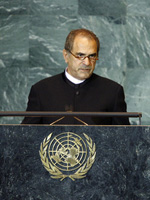Timor-Leste
H. E. Mr. José Ramos-Horta, President
25 September 2008
- Video: English | Portuguese [RealPlayer - 16 min]
- Statement: English [PDF]
- Back to the list of speakers
Statement Summary

© UN Photo
Click for caption and to enlarge
JOSÉ RAMOS-HORTA, President of Timor-Leste, said increased demand for oil, higher food costs, a lack of arable land and water, and climate change were just a few indicators of the non-conventional security threats the world faced today. But crises offered opportunities. Changing the course for the hundreds of millions of people who left their ancestral homes for dashed dreams of a “better” life in cities was possible, if Governments invested in job creation programmes, especially for agricultural production.
Without redoubling international efforts to significantly bolster development aid, it would be almost impossible for poor non-oil-producing countries to achieve their modest goals, he continued. Donors must also re-size their aid for development and increase the portion of ODA devoted to agriculture to 30 per cent overall. Supporting the creation of the high-level task force to handle the food crisis, he thanked donors for their help, adding that it also must be asked whether that aid had helped improve peoples’ lives.
Timor-Leste, though a least developed country, had modest oil and gas wealth. With revenues averaging $100 million to $150 million per month, it could be argued that, for a country with slightly more than 1 million people, that was not too bad. At the same time, the country’s oil fund was invested in United States treasury bonds, and he was seeking to re-invest those funds in diversified portfolios across the world.
Timor-Leste was not indifferent to suffering in other parts of the world, he said, noting his Government’s commitment of some $50,000 for earthquake victims in Indonesia, and a pledge to donate $500,000 to victims of the recent earthquake in China. In 2009, Timor-Leste would start contributing $1 million annually to help children’s programmes in such countries as Myanmar. Specifically on Myanmar, he said Timor-Leste’s position was aligned with that of the Association of Southeast Asian Nations (ASEAN). No long-term solution would be found without the full partnership of the Army. The challenge was in persuading the Army that their interests would not be compromised.
Regarding Cuba, he said tropical storms Gustav and Ike had ruined the island nation’s economy, with losses totalling a staggering $5 billion. East Timorese medical students had been studying in Cuba, and 300 Cuban doctors working in Timor-Leste. While commending the United States supporting universal, democratic values, he said punitive measures, imposed on poor developing countries for the perceived actions of their leaders, could not be justified. He called for lifting the embargo on Cuba, and reiterated his heartfelt sympathy with Haiti, among others, recently impacted by natural disaster.
Turning to his country’s situation, he recalled that he had almost been fatally shot earlier this year. “I escaped by an act of God”, and with support from doctors and nurses in Australia, he said, adding that: “I stood at the frontier of life and death. I saw the beauty of life that I almost left behind.” Those events had served to unite people against violence; common crimes had dropped significantly, and a growing number of internally displaced persons were returning home.
On the economic front, he noted that real gross domestic product growth of around 7 per cent -– and around 19 per cent when taking oil revenue into account -– were successes that would not have been possible without global support. The professionalism of international forces was visible to all, and he especially thanked the United Nations police force in his country. In closing, he said that, with a shared vision and commitment to serve the poorest of the poor, he was confident that the Millennium Development Goals would be met.
[Source: GA/10754]